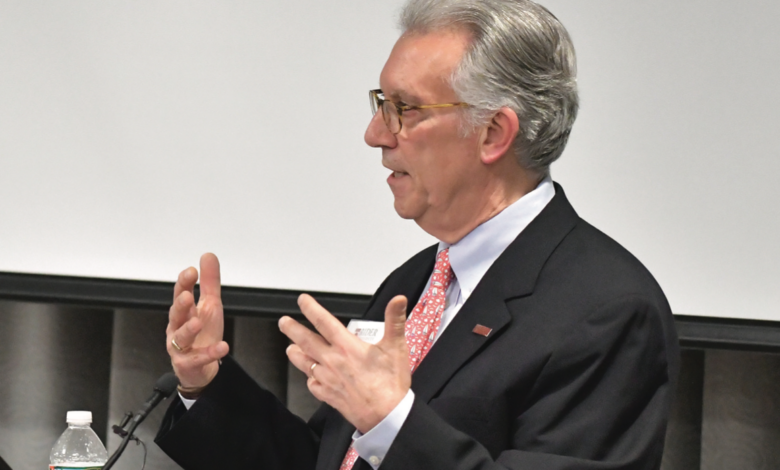
AAUP votes no-confidence against Dell’Omo
By Sarah Siock
With an 86% majority, faculty in Rider’s chapter of the American Association of University Professors (AAUP) passed a no-confidence motion against President Gregory Dell’Omo and called on the Board of Trustees to remove him, the union announced on Feb. 8. However, the board quickly and publicly rejected the union’s request.
The motion comes after a week of online anonymous voting by union members. This vote is the second no-confidence motion against Dell’Omo during his six-year tenure at Rider. The preceding vote against the president in 2017 passed with a 75% majority and was the first in Rider’s history, but it did not ask the Board of Trustees to remove Dell’Omo.
“We are requesting the Board of Trustees to utilize their authority to remove the president. The Board of Trustees have a fiduciary responsibility to protect the financial stability of the institution. We’ve specified the decisions made by the president that have put the university at risk, and the very survival of the institution at risk,” said AAUP Chief Grievance Officer Jeffrey Halpern, a sociology professor.
The resolution explains the AAUP’s decision and says, “… Dell’Omo’s strategic policies have seriously eroded Rider’s financial position, reducing net income by $6 million, increasing non-teaching expenses by $8 million between 2015 and 2019 (pre- pandemic) while significantly increasing Rider’s debt, in a time period where peer institutions in Rider’s market experienced increased enrollment and net revenue.”
The resolution also cites Dell’Omo’s decision to move Westminster Choir College from its Princeton campus to Rider’s Lawrenceville campus as a reason for the faculty’s no-confidence vote.
“… Dell’Omo’s strategic decisions in regards to Westminster Choir College have resulted in lost alumni support, reduced enrollments for the university, lost reputational status and resulted in expensive legal and consulting fees, actions which have alienated students, alumni, faculty and artistic partners of the University,” the resolution states.
Within an hour of the union’s announcement, the Board of Trustees declared its full endorsement of Dell’Omo.
In a Feb. 8 press release, John Guarino ’82, chairman of the Board of Trustees, said, “Although the voices of all members of the Rider community are important, the Board of Trustees is profoundly disappointed by this action [no-confidence vote] and reaffirms its support of President Dell’Omo and his leadership team. … Throughout his tenure, President Dell’Omo has consistently demonstrated his commitment to move Rider forward and secure a stable future for the university. We recognize that some of the decisions President Dell’Omo must make for the future of Rider may be unpopular. That is the nature of change, but Rider must change, that is for certain. It is our sincere hope that members of the AAUP will
cooperate with the administration and be a part of the process to strengthen our foundation so Rider can continue to grow and thrive.”
The no-confidence vote follows the university administration’s announcement on Jan. 24 of a voluntary separation program for non-faculty employees to reduce salary and benefit expenses with a warning that layoffs were possible if savings goals weren’t met. The university is currently projecting a $20 million deficit.
“Dell’Omo’s poor management has cost Rider University millions and millions of dollars. To remedy this, he plans on layoffs and buy-outs, but the only person who should receive a pink slip is Greg Dell’Omo. If Rider is to survive, Dell’Omo must go,” said AAUP President Barbara Franz, a political science professor, in a Feb. 8 press release.
In the university press release, Dell’Omo reaffirmed his confidence in his strategic policies and pointed to the pandemic as one of the reasons for the university’s financial situation.
Dell’Omo said in the press release, “Every day, tuition-dependent private institutions like Rider are grappling with issues related to affordability, enrollment, competition, shrinking state and federal funding, student success and retention and the looming drop in the number of high school graduates. As if this wasn’t enough, a global pandemic swept in, exacerbating existing challenges and creating unforeseen new ones. … While we have already accomplished so much in addressing financial challenges related to the pandemic, enrollment and more, we must take decisive, but difficult steps to achieve financial stability to position Rider so that we can continue to invest strategically and improve the delivery of our mission and student outcomes given the changing environment we face.”
However, Halpern said decisions made before the pandemic have led the AAUP to pass the no-confidence motion. Halpern explained that Rider’s bond rating status, which has been downgraded three times during Dell’Omo’s presidency, played a role in the union’s decision.
“We have now had multiple years of cash deficits and they [the administration] are moving to force staff to leave the institution by offering them small buyouts, and if they don’t take the buyouts they will be terminated. These are all signs of an institution that’s not fiscally safe,” said Halpern.


